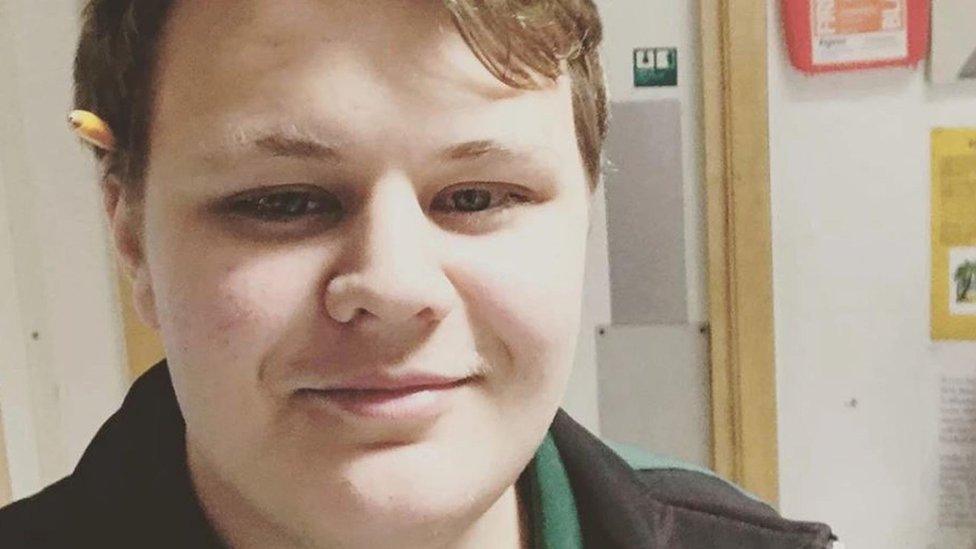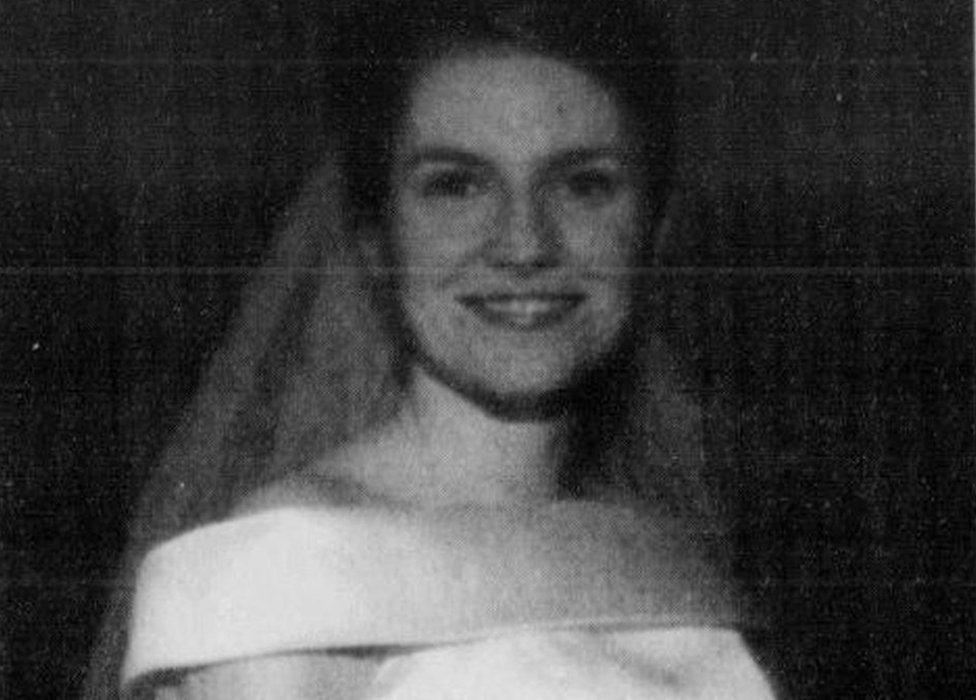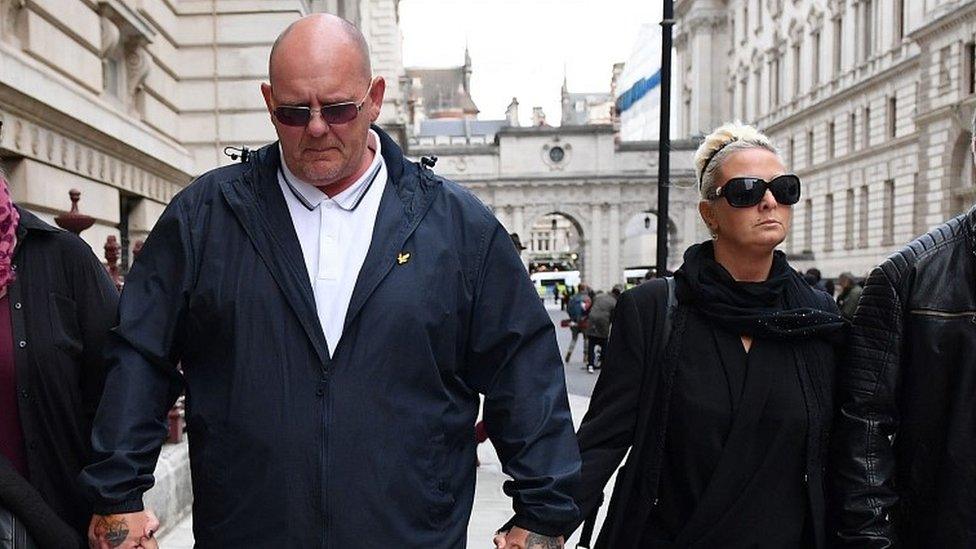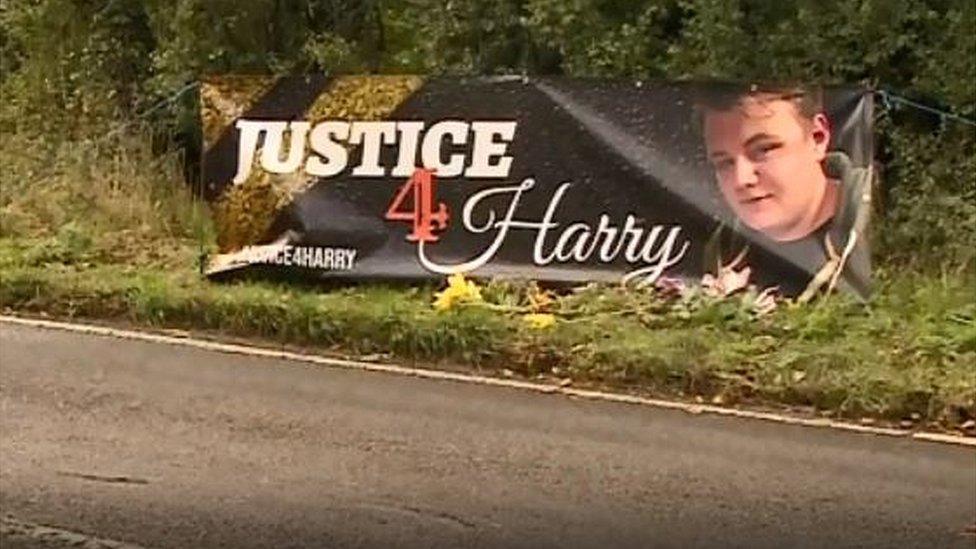Harry Dunn: How the death of a teen became a transatlantic row
- Published

Harry Dunn died in hospital after his motorbike was involved in a crash outside RAF Croughton
The UK and US governments have announced a change to an "anomaly" that allowed the suspect in a fatal car crash to claim diplomatic immunity. But how have we reached this point nearly a year after the crash?
On 27 August 2019, 19-year-old Harry Dunn was out riding his motorbike near RAF Croughton in Northamptonshire when involved in a crash.
The RAF base is home to a US Air Force communications station, and it is believed the driver of the car involved in the crash with Mr Dunn was the wife of a diplomat, Anne Sacoolas.
Northamptonshire Police began to investigate the crash, but despite telling the force she had no plans to leave the UK, Mrs Sacoolas returned to the US claiming diplomatic immunity.
Under the 1961 Vienna Convention, diplomats and their family members are immune from prosecution in their host country, so long as they are not nationals of that country, but immunity can be waived by the state that has sent them.
In October, Mr Dunn's mother Charlotte Charles appealed "as a mum" for Mrs Sacoolas to return to the UK for questioning.

Anne Sacoolas, pictured on her wedding day in 2003, cited diplomatic immunity after the crash outside RAF Croughton
Prime Minister Boris Johnson soon urged the US to reconsider Mrs Sacoolas' immunity.
But briefing notes held by President Donald Trump at a press conference were caught by photographers stating: "...That the spouse of the US government employee will not return to the United Kingdom."
On 9 October, Mrs Charles and Mr Dunn's father Tim Dunn attended a meeting with Foreign Secretary Dominic Raab to discuss in the hope he would urge the US to waive Mrs Sacoolas' immunity.
But they left the meeting "angry and frustrated" and feeling as though it had been a "publicity stunt".
Three days later, Mrs Sacoolas, through her legal representative, said she was "devastated by the tragic accident" and would "continue to co-operate with the investigation".
Amy Jeffress said her client would "continue to co-operate with the investigation".
Mr Dunn's parents then went to the US, appearing on a host of media outlets to raise awareness of the case, and had a meeting set up with Mr Trump at the White House.
However, they said they felt "a little ambushed" when the President revealed Mrs Sacoolas was in the next room during the session.
Tim Dunn later told a US TV Network: "We said no, we didn't feel it was right. He said 'she's here, let's get it on, get some healing,' something like that.
"There was a bit of pressure but we stuck to our guns."

Tim Dunn and Charlotte Charles rejected a "bombshell" meeting with Mrs Sacoolas offered by Donald Trump
Meanwhile, the investigation into the crash continued.
It is now believed Mrs Sacoolas was driving on the wrong side of the road when Mr Dunn was killed.
In December, the Crown Prosecution Service announced Mrs Sacoolas would be charged with causing death by dangerous driving, which carries a maximum prison sentence of 14 years.
But a Home Office extradition request was refused by US Secretary of State Mike Pompeo in January, and American officials said the decision was final.
Ms Charles and Tim Dunn have since brought legal action against foreign secretary Mr Raab and Northamptonshire Police, claiming they acted unlawfully over Mrs Sacoolas' departure.

There has been an energetic campaign to keep the story in the public eye, including banners near put up near the site of the crash
At a High Court hearing last month, their lawyer Geoffrey Robertson QC said the Foreign Office had "obstructed a criminal investigation, under pressure from the United States".
But their application relating to the disclosure of a "secret agreement" between the governments was rejected.
The two governments have now agreed to amend the "anomaly" that allowed Mrs Sacoolas to claim diplomatic immunity.
However, it is understood the alteration is not retrospective.
While it appears the change will not affect their case, Mr Dunn's family have vowed to continue the campaign to bring Mrs Sacoolas before a UK court.
"We always live with hope that one day she might just decide of her own accord to put herself on a plane and come back over here," Ms Charles said.
"We definitely will keep the pressure up."

Find BBC News: East of England on Facebook, external, Instagram, external and Twitter, external. If you have a story suggestion email eastofenglandnews@bbc.co.uk, external
- Published22 July 2020

- Published19 July 2020

- Published18 June 2020
